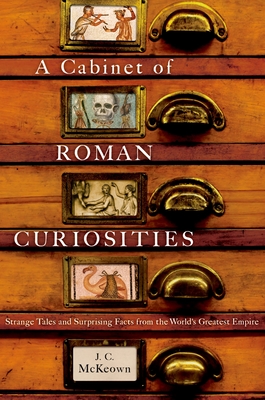A Cabinet of Roman Curiosities: Strange Tales and Surprising Facts from the World's Greatest Empire

A Cabinet of Roman Curiosities: Strange Tales and Surprising Facts from the World's Greatest Empire
Here is a whimsical and captivating collection of odd facts, strange beliefs, outlandish opinions, and other highly amusing trivia of the ancient Romans. We tend to think of the Romans as a pragmatic people with a ruthlessly efficient army, an exemplary legal system, and a precise and elegant language. A Cabinet of Roman Curiosities shows that the Romans were equally capable of bizarre superstitions, logic-defying customs, and often hilariously derisive views of their fellow Romans and non-Romans.
Classicist J. C. McKeown has organized the entries in this entertaining volume around major themes--The Army, Women, Religion and Superstition, Family Life, Medicine, Slaves, Spectacles--allowing for quick browsing or more deliberate consumption. Among the book's many gems are:
- Romans on urban living:
The satirist Juvenal lists fires, falling buildings, and poets reciting in August as hazards to life in Rome. - On enhanced interrogation:
If we are obliged to take evidence from an arena-fighter or some other such person, his testimony is not to be believed unless given under torture. (Justinian) - On dreams:
Dreaming of eating books foretells advantage to teachers, lecturers, and anyone who earns his livelihood from books, but for everyone else it means sudden death - On food:
When people unwittingly eat human flesh, served by unscrupulous restaurant owners and other such people, the similarity to pork is often noted. (Galen) - On marriage:
In ancient Rome a marriage could be arranged even when the parties were absent, so long as they knew of the arrangement, or agreed to it subsequently. - On health care:
Pliny caustically described medical bills as a down payment on death, and Martial quipped that Diaulus used to be a doctor, now he's a mortician. He does as a mortician what he did as a doctor. For anyone seeking an inglorious glimpse at the underside of the greatest empire in history, A Cabinet of Roman Curiosities offers endless delights.
PRP: 136.34 Lei
Acesta este Prețul Recomandat de Producător. Prețul de vânzare al produsului este afișat mai jos.
122.71Lei
122.71Lei
136.34 LeiLivrare in 2-4 saptamani
Descrierea produsului
Here is a whimsical and captivating collection of odd facts, strange beliefs, outlandish opinions, and other highly amusing trivia of the ancient Romans. We tend to think of the Romans as a pragmatic people with a ruthlessly efficient army, an exemplary legal system, and a precise and elegant language. A Cabinet of Roman Curiosities shows that the Romans were equally capable of bizarre superstitions, logic-defying customs, and often hilariously derisive views of their fellow Romans and non-Romans.
Classicist J. C. McKeown has organized the entries in this entertaining volume around major themes--The Army, Women, Religion and Superstition, Family Life, Medicine, Slaves, Spectacles--allowing for quick browsing or more deliberate consumption. Among the book's many gems are:
- Romans on urban living:
The satirist Juvenal lists fires, falling buildings, and poets reciting in August as hazards to life in Rome. - On enhanced interrogation:
If we are obliged to take evidence from an arena-fighter or some other such person, his testimony is not to be believed unless given under torture. (Justinian) - On dreams:
Dreaming of eating books foretells advantage to teachers, lecturers, and anyone who earns his livelihood from books, but for everyone else it means sudden death - On food:
When people unwittingly eat human flesh, served by unscrupulous restaurant owners and other such people, the similarity to pork is often noted. (Galen) - On marriage:
In ancient Rome a marriage could be arranged even when the parties were absent, so long as they knew of the arrangement, or agreed to it subsequently. - On health care:
Pliny caustically described medical bills as a down payment on death, and Martial quipped that Diaulus used to be a doctor, now he's a mortician. He does as a mortician what he did as a doctor. For anyone seeking an inglorious glimpse at the underside of the greatest empire in history, A Cabinet of Roman Curiosities offers endless delights.
Detaliile produsului











